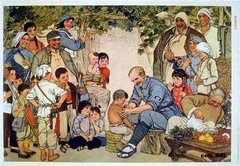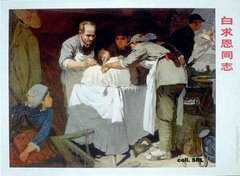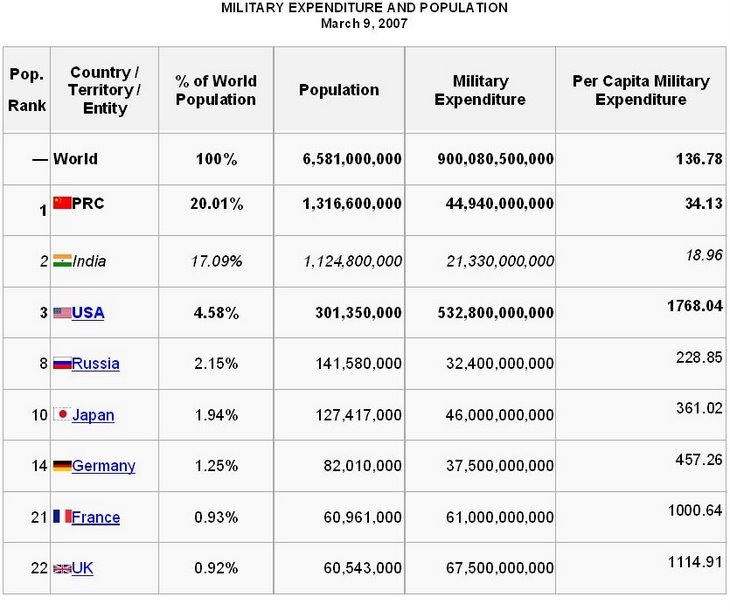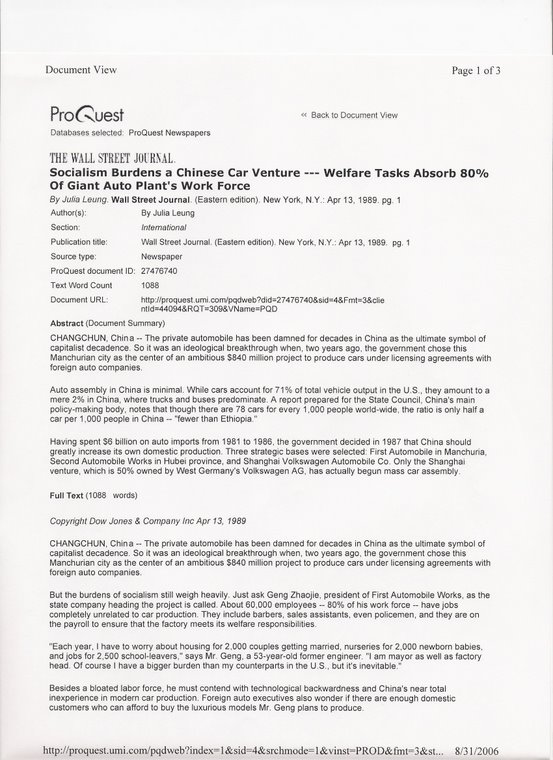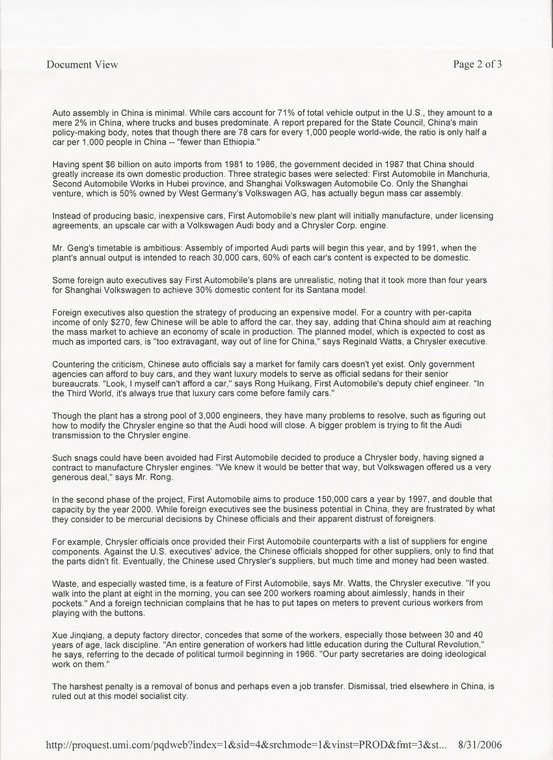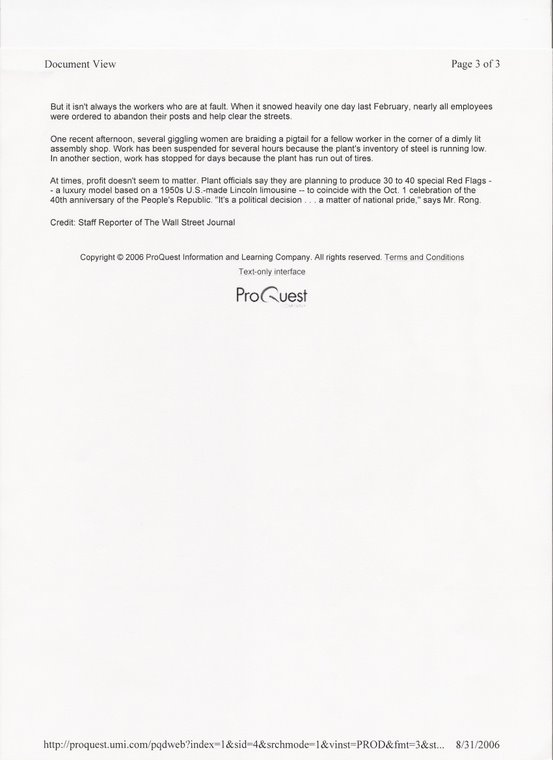By: Sidney J. Gluck
Submitted to the Salzburg Seminar 438 on China – December 5-10, 2006
The myriad of contradictions in China’s revolutionary development cannot be fully grasped unless we place it in the context of an epochal world transition from one form of production relationships and its social content to another that carries forward achievements of the old society to better serve humanity. Such transitions have taken place in the history of civilization. The center of change shifted geographically. Within this context, human nature and relationships have also changed, in essence, reflecting property rights and the goals of commensurate relationships.
The most recent historic example is the European transition from feudal agricultural and handicraft based production relations to wage-labor relations of the capitalist system. The transition took hundreds of years of ebb and flow of conflicting interests between a rising mercantilist bourgeoisie and monarchial dominated feudal land enclosure which limited commerce, production and the extension of money forms of exchange and accumulation. Many nations experienced revolutionary moments before the demise of feudal domination.
In periods of transition, contradictions between the socio-economic relations of the new system and elements of the old (the old within the new and the new within the old) defy description by any one simplistic set of relationships. The pace of change depends upon the ability of the old structure to make contributions to economic growth and ability to sustain and improve human conditions. The new grows as it brings greater social benefits. China’s peaceful rise to world prominence must be seen through multiple lenses to determine the nature of its present stage of development and socio-political direction.
We live in an epoch of change that made its first appearance almost one hundred years ago after WWI when conflicts among the dominant colonialist and aspiring imperialist nations showed the gluttony of the private capitalist system which dominated the rest of the world. The social revolutions that challenged the system were defeated in all but Russia where a new system in the name of socialism emerged.[1]
Karl Marx may have predicted an era of Socialist Revolution growing out of class antagonisms and exploitation in Europe (he noted that the Asian experience would differ and intended to elaborate); but it was Lenin who opened an era of Socialist Revolution by turning an inter-imperialist conflict into a civil war. He turned the disillusionment of Russian working people and peasants, who were the majority, into a democratic expression of national aspiration.
This opened an era of change by introducing a new form of government that had yet to establish its social and economic structure, a process interrupted by his death and altered into a centrally planned command system without recognition of private property. The new era did not open on a consistent line of development. Lenin had warned that the road to socialism must be a many-sided struggle for democracy; hence, from the beginning, the epochal change had contradictions within it. In fact, when some Eastern European countries under Communist governments proceeded with more democratic elements in their growth, the Soviet Union took military action to keep them as clones.
Lenin had proposed an economic policy that invited capitalist forms of investment and construction to participate in introducing modern industrial development with the intent of a more just distribution of social wealth, essentially introducing mass participation with social planning that would lead to socialism. He saw the revolution as a process in stages. This seems to correspond with Karl Marx’ vision that after a government takes power in the name of the working population, the majority in the nation, that there would be a long period of continuation of “bourgeois private rights,” entrepreneurism and the distribution of social wealth on the basis of individual capability of contributing to growth (“from each according to ability, to each according to contribution” – not equal, but relatively equal since he recognized that individuals differ and yet are part of the whole).
The capitalist world responded in two ways during the 1920s and 30s. One, as an example, was the Welfare State in England and the New Deal in the United States as liberal defensives against the socialist idea. Simultaneously, a second reaction was the support for German Fascism which promised a “grand march to the East” for military destruction of the Soviet incubator.
The introduction of macro-economic planning as a structural mechanism for social control and guidance of economic objectives and growth, as distinct from individualist control of capital formations in the West, was a major departure from capitalist methodology resulting in a consistent growth rate without economic recessions. Unfortunately, the five year plans in the Soviet Union concentrated on military defense that proved equal to the most advanced in the Western world. On the other hand, other aspects of social and economic life (with the exception of culture and education) were neglected, as were the individual capabilities of citizens organized for maximum creativity which dampened natural entrepreneurial propensities. The Soviet Union defeated the German invasion at Stalingrad before the second front was opened from the West. One still wonders whether that second front was opened as an ally or as an effort to stem a Red Army advance to the English Channel as German defenses collapsed.
In 1947, the United Nations was founded as a peacekeeper to resolve problems arising from a world moving in two economic systems. We make no comment here on the differences between the socialism of the Soviet Union and how it related to the Eastern European socialist countries that in some cases were put down by the Red Army. While the UN was established as an oasis for compromise, in the very same year, Churchill (in Fulton, Missouri) rang the gong for the opening of the Cold War.
Still in the epoch of change, the world entered a period of imminent mutual destruction as both sides had the atom bomb. The USSR failed from its own internal contradictions, not following a democratic course involving its entire population. It also followed a policy of exporting and supporting revolution. In this context, it aided the Communist movement in China after the split of the KMT and supported the civil war with Chiang Kai Shek who assumed control of the KMT-led central government. Sun Yat Sen had hoped to maintain a single KMT Party as a democratic expression which combined the Communist movement with the Chiang Kai Check comprador capitalists; but it inevitably fell apart after his death.
Ironically, while the civil war in China continued for the next fifteen years, the Japanese invaded China in the opening of WWII. The USA, in efforts to defeat the Japanese, built the Burma Road and air routes in order to supply the Chinese with military equipment. Since the geographical contacts were with Western China, where the Communist movement had built a Red Army, it was possible for the Communists to build a second army, the People’s Liberation Army.
Chiang Kai-shek maintained a civil war while the two Communist led armies confronted the Japanese until their surrender and then confronted the KMT with its superior forces. After four more years, the KMT fled the mainland to the islands of Quemoy and Matsu as stepping stones to the occupation of Taiwan. The inclination to pursue them led to USA gunboat presence in the Taiwan Straits threatening intervention in China’s civil war. That separation of Taiwan from the mainland is now in the diplomatic stages of integration into the economic growth on the mainland with political implications that will probably result in ultimate reunification. The present Chinese regime differs in its approach to Taiwanese-mainland unification. Since 2003, the new regime has substituted diplomacy, economic opportunity and national pride, superseding the military stance of Jiang Zemin. We have witnessed increasing friendly political and economic exchanges towards peaceful integration, embracing the “One China Principle” that had been recognized by successive USA presidents since Nixon’s visit to Beijing in 1972. The Taiwanese economy would be much like that of Hong Kong as another part of China’s characteristic “One Country, Two Systems,” another example of the complexity of China’s mixed economy.
A year before Nixon’s visit, the United Nations General Assembly had recognized Beijing as the legitimate occupant of China’s seat in the Security Council, ousting the Taiwanese-Chinese who had been installed under Churchill’s pressure during its formation. This confirmed the legitimacy of the “One China Principle.”
In 1957 China split with the Soviet Union. Mao’s contention, having been denied high tech help, was “China will not be a junior partner in socialism.” Notwithstanding the chaos of the economic mis-planning of the Great Leap Forward that followed the split and the ten year disruption of the Cultural Revolution (all based on meager economic development and lack of knowledge of Classical Marxism and Political Economy), the Party’s leadership was sustained by an egalitarian rice bowl economy based on the concept of collectivity. This had no base on political economy or theory, though it did ideologically connect with Confucius’ principles of “fairness” and “education.”
By 1975-6, both Mao Zedong and Chou En Lai had died. Towards the end there had been a mass democratic surge in the population. Chou En Lai, in his last year, had left a recommendation in the hands of Deng Xiaoping (whose life he had protected), proposing a new economic approach to building the economy so it could sustain the Chinese people. He advocated modernizing industry, which meant establishing extensive socialized forms of production that would require a commensurate marketing exchange system. He also recommended an opening of economic relations with the West. Deng Xiaoping, who was not the top leader in the Communist Party, nor even an experienced political economist, spent three years to convince the Party’s political center to embark on a new economic revolution. In 1978 the Party decided to modernize, establishing a regulated market and the sanctioning of private ownership, along with State Owned Enterprise and the opening of economic relations with the West.
The world is now aware of China’s success as a growing economic power. Notwithstanding contradictions and conflicts among economic groups, China’s accomplishments have not only been internal. Since China’s growth is dependent upon foreign supplies, it has affected global economic relations, resulting in the emergence of a new plateau of international relationships that foster the independence of undeveloped, former colonial nations.
The present stage of globalization is failing to eliminate world poverty and contributing to planetary destruction. According to Wolfowitz of the World Bank, China’s effort to eliminate poverty is exemplary and the Bank is encouraging this process with a small loan program to stimulate development. One must also take note of the fact that the Chinese Communist Party has had to change its economic and social planning because of the plethora of public demonstrations based on egalitarian principles and fairness.
The plans of the new regime in China have rejected the slogan “To Get Rich is Glorious” and are emphasizing a harmonious society that will undergo structural changes to create an equitable distribution of its wealth to all sections of the population. In essence, the structural changes will probably lead to establishment of a form of Welfare State – a New Deal, which has been under discussion in China since 2002. In fact, the current five year plan that began in 2006 has had its objectives altered in that direction with a promise that 90% of the population will be benefited by structural changes to guarantee Social Security by 2020. If this is accomplished, it is a great example to other countries. The very process is not to build a super-power but an economic power that is the engine of change affecting many of the smaller nations seeking their own economic independence.
This is the nature of the epoch we are living in. It is probably difficult for people who have been accustomed to private decision making to readjust to more collective forms of functioning; but private decision making is not meeting the needs of the majority of people around the world, hence, the people in each country in democratic ways will find ways of participating in the new economic plateaus that will give them an opportunity for self development.
Notwithstanding the spectacular growth of one quarter to one third of the country, which is now integrated into the world economy, the vast majority of Chinese people and the land are underdeveloped. China then can act in many ways as an advanced economic entity but is faced simultaneously with the drag of underdevelopment, just as the people of former colonial countries today. Yet, China must be invited to play an important role in the WTO and the World Bank to influence decisions and direct international capital towards efforts to support underdeveloped nations in their economic development as a basis for eliminating poverty.
The 20th century saw the beginning of an epoch of social change. World conditions did not favor a rejection of private capitalist motivation for development, but the seeds and pressures for social change continued to grow even as multinational corporations created a super-power dominated globalization. Simultaneously, during the last quarter of the century, new elements emerged to challenge this mode, demanding a share of technology, productivity and consumption.
The 21st century then emerges with two centers for change: The United Nations and China. This assumes non-military conflict resolution, non-super-power progression. From having shunned diplomatically to avoid relations with the West, the imperialist occupation of China in the 19th century and its re-emergent independence in the 20th century has now grown to be a nation open and willing to share and participate peacefully as an economic force in the world.
There is much confusion and contention in influencing the direction of China; much wishful thinking and profit taking, as well as condemnation from the Left. To quote a participant in a recent Radical Philosophy Association Conference[2]:
“What's Wrong with China?
There's plenty wrong with China, as everyone knows.
· The income gap is large and widening--China's Gini coefficient, a standard measure of income inequality, is now larger than the U.S.'s.
· Unemployment is rising as large numbers of state-owned enterprises shed workers, before or after they are privatized.
· There are sweatshops providing the Wal-Marts of the world with cheap manufactured goods.
· Corruption is rampant.
· So is environmental degradation. Consider the comments of Pan Yue, China's Deputy Environmental Minister, made in a recent interview:
‘Our raw materials are scarce, we don't have enough land and our population is constantly growing. . . . Cities are growing, but desert areas are expanding. . . . Five of the most polluted cities in the world are in China; acid rain is falling on one third of our territory; half of the water in China's seven largest rivers is completely useless, a quarter of our citizens lack access to clean drinking water.[3]
With so many things wrong, China must be capitalist, right?
A recent Pew Research Center survey finds China to be "the world leader in hope for the future"--the most optimistic of the 17 nations surveyed. Not only was personal optimism high, but China led the list regarding "satisfaction with national conditions. Fully 72% indicated satisfaction, as opposed to 19% dissatisfied. This compares with only 39% of the U.S. population surveyed indicating satisfaction, 57% dissatisfied. That is to say, the percentage of people satisfied with the condition of their country is nearly double that of the U.S., whereas only a third as many are dissatisfied.”
Internally in China the intense effort to build industrially neglected the conditions of workers. In fact, it destroyed what there was of collectivism among the peasants and the security system of workers in the State Owned Enterprises. A legitimate question was raised as to whether China was developing into a strong Capitalist country, exploiting their own people and abandoning Socialist principles of fairness, sharing and collectivity, or as they put it, abandoned the Socialist Road. By the year 2002, the Left around the world was convinced that China’s Market Socialism had wronged its people and cried “Restoration of Capitalism.”
In a course taught by the writer of this essay, we observed that:
“National variants in the socialist economic and political system have fostered misconceptions and illusions as to the nature, theory and practice of socialism . . . . Socialism develops in stages before and after a revolution, in democratic surges . . . . National variants of socialist models are inevitable . . . . Revolution is not an import . . . . nor an export . . . . but arises out of history and reflects the resolution of antagonisms within each country.” [4]
Yet, macro economics coupled with social planning for an equitable distribution of the social product is common to all.
Almost one hundred years after the first Socialist Revolution, following a long period in which Western capital continued its growth and contribution to world development, it has reached the stage where there is only one super-power and, as a system, contributes little to protection of the planet and the health and living conditions of people around the world. The twentieth century incubated epochal changes with the rise and demise of a Socialist minded power, the stifling globalization of financial capital and the emergence of a Socialist minded competitor and creditor to a lame growth Western World suffering negative trade imbalances and indebtedness despite multi-billion dollar merges and financial accumulation.
In 1906 W.E.B. Dubois predicted that the time would come when Asia and Africa joined their development, it would break the color line around the world. Before he died in the mid 20th century, he predicted that China’s relationship with Africa would be decisive. We are, at this moment, living that prediction, wherever it leads. Witness changes in Latin and South America, particularly Venezuela, and the championing of China’s representing the developing countries in the WTO, as well as being urged to assume a more active roll in the UN.
The Wall Street Journal reported on December 14, 2006 that at an opening conference on currency and trade relations in Beijing, Chinese Vice Premier Wu Yi told US Treasury Secretary Henry Paulson and his delegation “Americans simply don’t understand China.” At a dinner the evening after he met with President George W. Bush on April 20, 2006, President Hu Jintao pronounced, “One of the main problems in US-China relations is the question of planning.” This simple statement posits the main difference between private decision-making on national destiny with a new form of social decision-making in macro-planning. This is the fundamental development emerging in this historic epochal change.
May the sensibility of diplomacy prevail over the senselessness of unilateralism and military determinism – and humanity achieve the prescient religious concept of a harmonious society in the name of “socialism.”
December 8, 2006
New York City
Sidney J. Gluck
Professor Emeritus at the New School for Social Research
Co-President of the US-China People’s Friendship Association
President of the Sholom Aleichem Memorial Foundation
Textile Innovator and Patent Holder
[1] The concept of socialism actually arose among religious groups and was hotly debated pro and con at the time that Marx and Engels wrote The Manifesto, so they chose to call it the “Communist Manifesto.” Socialism should not be a scare word since it has humanistic intent.
[2] David Schweikart, “China: Market Socialism or Capitalism?”
[3] Andreas Lorenz, "China’s Environmental Suicide: A Government Minister Speaks," Open Democracy (April 5, 2005).
[4] “Comparative Socialism” at the New School for Social Research, New York City, 1973.
A reader responds...
with views that differ with Sidney...
... what do you think?
-----Original Message-----
From: Michael Wood [mailto:mwood42092@yahoo.com]
Sent: Wednesday, February 14, 2007 9:22 PM
To: Alan Maki
Subject:
Re: China and Socialism Blog
Comrade!
I appreciate the opportunity to read this article.
I am unable to make a comment on your blog so I am sending it to your e-mail.
I believe that formulations about the USSR in this blog, such as the following are questionable:
"The USSR failed from its own internal contradictions, not following a democratic course involving its entire population."
I warmly wish to point out that the former Soviet Union was, despite it's shortcomings, an inherently democratic society which guaranteed full employment and free healthcare.
I believe that the above formulation does not consider the encirclement of the USSR by hostile capitalist countries nor the revision of Marxism-Leninism by leaders such as Gorbachev.
I am concerned that if we don't draw the correct conclusions about the USSR from a working-class standpoint that we may make unnecessary errors in the future.
We invite all blog readers to comment on, and question, anything posted on this blog. You may send your comments to:
We reserve the right not to publish unsigned comments, but common sense will prevail... When sending comments or questions please state if you want them published on the blog.



